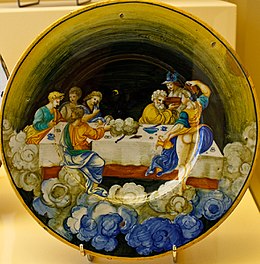Ambrosia
Upon his assumption into immortality on Olympus, Heracles is given ambrosia by Athena, while the hero Tydeus is denied the same thing when the goddess discovers him eating human brains.The concept of an immortality drink is attested in at least two ancient Indo-European languages: Greek and Sanskrit.The Greek ἀμβροσία (ambrosia) is semantically linked to the Sanskrit अमृत (amṛta) as both words denote a drink or food that gods use to achieve immortality.The two words appear to be derived from the same Indo-European form *ṇ-mṛ-tós, "un-dying"[20] (n-: negative prefix from which the prefix a- in both Greek and Sanskrit are derived; mṛ: zero grade of *mer-, "to die"; and -to-: adjectival suffix).A semantically similar etymology exists for nectar, the beverage of the gods (Greek: νέκταρ néktar) presumed to be a compound of the PIE roots *nek-, "death", and -*tar, "overcoming".


Ambrosia (disambiguation)majolicaNicola da UrbinoGreek mythsAncient GreekGreek godslongevityimmortalityOlympusGanymede heavenly feast AmbrosiaDionysusPenelopeAlcmanSapphoAnaxandridesAristophanesKnightsHeraclesAthenaTydeusTantalusperfumeOdysseyAthenaeusPaulusDioscuridesethnomycologistsDanny StapleshallucinogenicAmanita muscariaW. H. RoscherentheogenMeropeMelissaIndo-EuropeanSanskritamṛtazero gradeAchillesThetisPeleusArgonauticaApolloSarpedonPatroclusunguentsCalypsoHermesOdysseusPolyphemusPindarPrometheusKarl KerenyiHomeric hymnAphroditeEros and PsycheApuleiusAeneidAeneasLycurgus of ThracemosaicHerculaneumThraceAmritaElixir of lifeIðunnPeaches of ImmortalityPill of ImmortalitySilphiumChisholm, HughEncyclopædia BritannicaHornblower, SimonOxford Classical DictionaryOxford University PressrosemaryChambers's EncyclopædiaGeorge NewnesEncyclopedia of Indo-European CultureBrattleboro Typographic CompanyRuck, Carl A.P.Ancient Greek religionmythologyReligionAges of ManGolden AgeHeroic AgeAncient accounts of HomerApotheosisDaemonDestinyEudaimoniaEuhemerismEunoiaEusebeiaGolden meanGolden RuleGreek words for loveHero cultHubrisInterpretatio graecaKatabasisKnow thyselfMetamorphosisMetempsychosisNympholepsyParadoxographyPatron godsPederastyPhronesisPolytheismSophrosyneepic poemsEpic CycleAethiopisCypriaIliupersisLittle IliadNostoiTelegonyTheban CycleOedipodeaThebaidEpigoniAlcmeonis